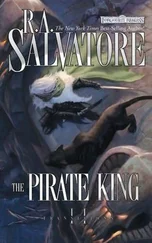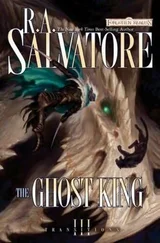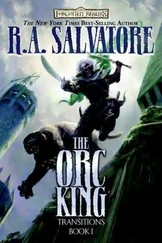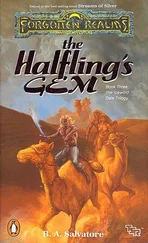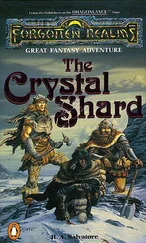Robert Salvatore - The Spine of the World
Здесь есть возможность читать онлайн «Robert Salvatore - The Spine of the World» весь текст электронной книги совершенно бесплатно (целиком полную версию без сокращений). В некоторых случаях можно слушать аудио, скачать через торрент в формате fb2 и присутствует краткое содержание. Жанр: Фэнтези, на английском языке. Описание произведения, (предисловие) а так же отзывы посетителей доступны на портале библиотеки ЛибКат.
- Название:The Spine of the World
- Автор:
- Жанр:
- Год:неизвестен
- ISBN:нет данных
- Рейтинг книги:4 / 5. Голосов: 1
-
Избранное:Добавить в избранное
- Отзывы:
-
Ваша оценка:
- 80
- 1
- 2
- 3
- 4
- 5
The Spine of the World: краткое содержание, описание и аннотация
Предлагаем к чтению аннотацию, описание, краткое содержание или предисловие (зависит от того, что написал сам автор книги «The Spine of the World»). Если вы не нашли необходимую информацию о книге — напишите в комментариях, мы постараемся отыскать её.
The Spine of the World — читать онлайн бесплатно полную книгу (весь текст) целиком
Ниже представлен текст книги, разбитый по страницам. Система сохранения места последней прочитанной страницы, позволяет с удобством читать онлайн бесплатно книгу «The Spine of the World», без необходимости каждый раз заново искать на чём Вы остановились. Поставьте закладку, и сможете в любой момент перейти на страницу, на которой закончили чтение.
Интервал:
Закладка:
First, peasants in Faerun are a powerless lot, subjected to the whims of unscrupulous lords and landowners, and with the ever-present threat of some invasion or another by goblins, giants, or fellow humans, stomping flat the lives they have carved. Prisoner's Carnival affords these unfortunate folk a taste of power, the power over life and death. At long last they feel some sense of control over their own lives.
Second, humans are not long-lived like elves and dwarves; even halflings will usually outlast them. Peasants face the possibility of death daily. A mother fortunate enough to survive two or three birthings will likely witness the death of at least one of her children. Living so intimately with death obviously breeds a curiosity and fear, even terror. At Prisoner's Carnival these folk witness death at its most horrible, the worst that death can give, and take solace in the fact that their own deaths, unless they become the accused brought before the magistrates, will not likely be nearly as terrible. I have witnessed your worst, grim Death, and I fear you not.
The third explanation for the appeal of Prisoner's Carnival lies in the necessity of justice and punishment in order to maintain order in a society. This was the side of the debate held up by Robillard the wizard upon my return to the Sea Sprite after witnessing the horror. While he took no pleasure in viewing the carnival and rarely attended, Robillard defended it as vigorously as I might expect from the magistrate himself. The public humiliation of these men, the public display of their agony, would keep other folk on an honest course, he believed. Thus, the cheers of the peasant mob were no more than a rousing affirmation of their belief in the law and order of their society.
It is a difficult argument to defeat, particularly concerning the effectiveness of such displays in dissuading future criminals, but is it truly justice?
Armed with Robillard's arguments, I went to some minor magistrates in Luskan on the pretense of deciding better protocol for the Sea Sprite to hand over captured pirates, but in truth to get them talking about Prisoner's Carnival. It became obvious to and very quickly, that the carnival itself had little to do with justice. Many innocent men and women had found their way to the stage in Luskan, forced into false confession by sheer brutality, then punished publicly for those crimes. The magistrates knew this and readily admitted it by citing their relief that at least the prisoners we brought to them were assuredly guilty!
For that reason alone I can never come to terms with the Prisoner's Carnival. One measure of any society is the way it deals with those who have walked away from the course of community and decency, and an indecent treatment of these criminals decreases the standards of morality to the level of the tortured.
Yet the practice continues to thrive in many cities in Faerun and in many, many rural communities, where justice, as a matter of survival, must be even more harsh and definitive.
Perhaps there is a fourth explanation for the carnival. Perhaps the crowds gather around eagerly merely for the excitement of the show. Perhaps there is no underlying cause or explanation other than the fun of it. I do not like to consider this a possibility, for if humans on as large a scale are capable of eliminating empathy and sympathy so completely as to actually enjoy the spectacle of watching another suffer horribly, then that, I fear, is the truest definition of evil.
After all of the hours of investigation, debate, and interrogation, and many, many hours of contemplation on the nature of these humans among whom I live, I am left without simple answers to travesties such as the Prisoner's Carnival.
I am hardly surprised. Rarely do I find a simple answer to anything concerning humans. That, perhaps, is the reason I find little tedium in my day-to-day travels and encounters. That, perhaps, is the reason I have come to love them.
– Drizzt Do'Urden
Chapter 14 STOLEN SEED
Wulfgar stood outside of Luskan, staring back at the city where he had been wrongly accused, tortured, and publicly humiliated. Despite all of that, the barbarian held no anger toward the folk of the town, even toward the vicious magistrate. If he happened upon Jharkheld, he would likely twist the man's head off, but out of a need for closure on that particular incident and not out of hatred. Wulfgar was past hatred, had been for a long time. As it was when Tree Block Breaker had come hunting him at the Cutlass, and he had killed the man. As it was when he happened upon the Sky Ponies, a barbarian tribe akin to his own. He had taken vengeance upon their wicked shaman, an oath of revenge he had sworn years before. It was not for hatred, not even for unbridled rage, but simply Wulfgar's need to try to push forward in a life where the past was too horrible to contemplate.
Wulfgar had come to realize that he wasn't moving forward, and that point seemed obvious to him now as he stared back at the city. He was going in circles, small circles, that left him in the same place over and over, a place made tolerable only through use of the bottle, only by blurring the past into oblivion and putting the future out of mind.
Wulfgar spat on the ground, trying for the first time since he had come to Luskan months before to figure out how he had entered this downward spiral. He thought of the open range to the north, his homeland of Icewind Dale, where he had shared such excitement and joy with his friends. He thought of Bruenor, who had beaten him in battle when he was but a boy, but had shown him such mercy. The dwarf had taken him in as his own, then brought Drizzt to train him in the true ways of the warrior. What a friend Drizzt had been, leading him on grand adventures, standing by him in any fight, no matter the odds. He'd lost Drizzt.
He thought again of Bruenor, who had given Wulfgar his greatest achievement in craftsmanship, the wondrous Aegis-fang. The symbol of Bruenor's love for him. And now he'd lost not only Bruenor, but Aegis-fang as well.
He thought of Catti-brie, perhaps the most special of all to him, the woman who had stolen his heart, the woman he admired and respected above all. Perhaps they could not be lovers, or husband and wife. Perhaps she would never bear his children, but she was his friend, honest and true. When he thought of their last encounter he came to understand the truth of that friendship. Catti-brie would have given anything to help him, would have shared with him her most intimate moments and feelings, but Wulfgar understood that her heart was truly for another.
The fact didn't bring anger or jealousy to the barbarian. He felt only respect, for despite her feelings, Catti-brie would have given all to help him. Now Catti-brie was lost to him, too.
Wulfgar spat again. He didn't deserve them, not Bruenor, Drizzt, nor Catti-brie. Not even Regis, who, despite his diminutive size and lack of fighting prowess, would leap in front of Wulfgar in time of crisis, would shield the barbarian, as much as he could, from harm. How could he have thrown all that away?
His attention shifted abruptly back to the present as a wagon rolled out of Luskan's western gate. Despite his foul mood, Wulfgar could not hold back a smile as the wagon approached. The driver, a plump elderly woman, came into view.
Morik. The two had been banished only days before, but they had hung about the city's perimeter. The rogue explained that he was going to have to secure some supplies if he was to survive on the open road, so he'd reentered the city alone. Judging from the way the pair of horses labored, judging from the fact that Morik had a wagon and horses at all, Wulfgar knew his sneaky little friend had succeeded.
Читать дальшеИнтервал:
Закладка:
Похожие книги на «The Spine of the World»
Представляем Вашему вниманию похожие книги на «The Spine of the World» списком для выбора. Мы отобрали схожую по названию и смыслу литературу в надежде предоставить читателям больше вариантов отыскать новые, интересные, ещё непрочитанные произведения.
Обсуждение, отзывы о книге «The Spine of the World» и просто собственные мнения читателей. Оставьте ваши комментарии, напишите, что Вы думаете о произведении, его смысле или главных героях. Укажите что конкретно понравилось, а что нет, и почему Вы так считаете.



